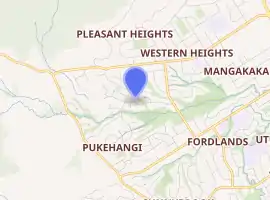Pukehangi
Pukehangi is a western suburb of Rotorua in the Bay of Plenty Region of New Zealand's North Island.
Pukehangi | |
|---|---|
Suburb | |

| |
| Country | New Zealand |
| Local authority | Rotorua Lakes |
| Electoral ward | West |
| Population (2018)[1] | |
| • Total | 5,277 |
| Western Heights | ||
| Ngongotahā Valley |
|
Mangakakahi |
| Fordlands | Sunnybrook |
History
In 2017, Rotorua District Council identified Pukehangi as a key area for future residential development.[2] An 89-section subdivision and a 33-section subdivsion were both announced that year.[3] More sections were due to become available in 2019.[4]
In December 2018, landowners of farmland west of the suburb sought planning consent to develop new residential areas.[5] The plan change was approved by the Rotorua District Council and Ministry for the Environment during 2019.[6][7] It was opened up it to public submissions in January 2020.[7]
In 2019, a Pukehangi rental home was the subject of a 7-month legal dispute between a landlord and tenant, which ended with the High Court terminating the tenancy.[8]
Demographics
| Year | Pop. | ±% p.a. |
|---|---|---|
| 2006 | 4,941 | — |
| 2013 | 4,887 | −0.16% |
| 2018 | 5,277 | +1.55% |
| Source: [1] | ||
Pukehangi, comprising the statistical areas of Pukehangi North and Pukehangi South, had a population of 5,277 at the 2018 New Zealand census, an increase of 390 people (8.0%) since the 2013 census, and an increase of 336 people (6.8%) since the 2006 census. There were 1,758 households. There were 2,496 males and 2,778 females, giving a sex ratio of 0.9 males per female, with 1,362 people (25.8%) aged under 15 years, 1,080 (20.5%) aged 15 to 29, 2,151 (40.8%) aged 30 to 64, and 684 (13.0%) aged 65 or older.
Ethnicities were 65.5% European/Pākehā, 44.7% Māori, 5.7% Pacific peoples, 5.9% Asian, and 1.4% other ethnicities (totals add to more than 100% since people could identify with multiple ethnicities).
The proportion of people born overseas was 13.4%, compared with 27.1% nationally.
Although some people objected to giving their religion, 53.6% had no religion, 34.8% were Christian, 1.0% were Hindu, 0.5% were Buddhist and 3.8% had other religions.
Of those at least 15 years old, 528 (13.5%) people had a bachelor or higher degree, and 861 (22.0%) people had no formal qualifications. The employment status of those at least 15 was that 1,911 (48.8%) people were employed full-time, 576 (14.7%) were part-time, and 285 (7.3%) were unemployed.[1]
| Name | Population | Median age | Median income |
|---|---|---|---|
| Pukehangi North | 2,706 | 28.0 years | $22,900[9] |
| Pukehangi South | 2,571 | 40.2 years | $32,800[10] |
| New Zealand | 37.4 years | $31,800 |
References
- "Statistical area 1 dataset for 2018 Census". Statistics New Zealand. March 2020. Pukehangi North (199100) and Pukehangi South (199200).
- Guy, Alice (15 September 2017). "Rotorua's Pukehangi, Ngongotaha and Eastside key areas for development". New Zealand Media and Entertainment. Rotorua Daily Post.
- Arthur-Worsop, Stephanie (17 June 2017). "33 lot subdivision goes up for sale". New Zealand Media and Entertainment. Rotorua Daily Post.
- Olley, Samantha (10 January 2019). "126 new Rotorua homes consented in 2018 but many more needed". New Zealand Media and Entertainment. Rotorua Daily Post.
- Makiha, Kelly (6 December 2018). "Residential plans for farmland bordering Pukehangi, west of Rotorua" (New Zealand Media and Entertainment). Rotorua Daily Post.
- Sparks, Zizi (28 March 2019). "Council recommends Government process to free up land for housing in Pukehangi quickly". New Zealand Media and Entertainment. Rotorua Daily Post.
- "Pukehangi Heights Plan Change proceeds". scoop.co.nz. Rotorua District Council. 21 January 2020.
- Sparks, Zizi (20 November 2019). "Tenancy Tribunal finding gives Rotorua landlord possession, 229 days after 90-day notice issued". New Zealand Media and Entertainment. Rotorua Daily Post.
- 2018 Census place summary: Pukehangi North
- 2018 Census place summary: Pukehangi South